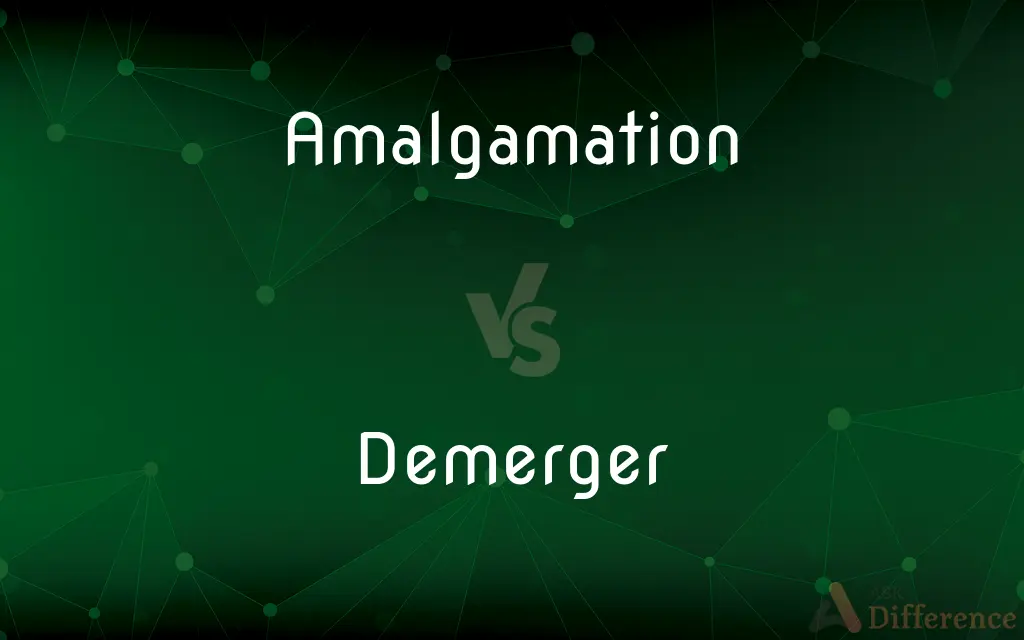Amalgamation vs. Demerger — What's the Difference?
Edited by Tayyaba Rehman — By Fiza Rafique — Published on December 14, 2023
Amalgamation is the combination of two or more companies into a single entity, while a demerger involves splitting a single company into multiple entities.

Difference Between Amalgamation and Demerger
Table of Contents
ADVERTISEMENT
Key Differences
Amalgamation is a process where two or more companies unite to form a new entity. Demerger, on the other hand, signifies the division of a single company into multiple separate entities.
While amalgamation seeks to harness combined strengths, resources, and synergies of companies, demerger aims to achieve better management focus, operational efficiency, or strategic redirection by segregating businesses.
From a strategic perspective, amalgamation can be pursued to expand market presence, combine resources, or achieve economies of scale. In contrast, demerger can be a tool to separate unrelated businesses, simplify corporate structure, or unlock hidden value.
Shareholders' perspectives vary: in amalgamation, they may receive shares in the new combined entity, while in a demerger, they might obtain shares in each of the newly formed entities.
On the financial front, amalgamation can lead to consolidated financial statements, whereas demerger can result in the creation of distinct financial statements for each split entity.
ADVERTISEMENT
Comparison Chart
Definition
Combination of companies into one.
Splitting of one company into several entities.
Objective
Harness combined strengths/resources.
Achieve better management focus or operational efficiency.
Resulting Entity
A new larger entity is formed.
Multiple smaller entities are created.
Shareholder Impact
Receive shares in the new entity.
Obtain shares in each new entity.
Financial Statements
Consolidated statements.
Distinct statements for each entity.
Compare with Definitions
Amalgamation
A merger of two or more companies into a single entity.
Two small tech firms underwent an amalgamation to compete with industry giants.
Demerger
The action of splitting one company into multiple separate entities.
After the demerger, the pharmaceutical unit became a standalone company.
Amalgamation
The action of combining resources or assets.
The library's amalgamation of rare books attracted researchers from all over.
Demerger
A strategy to segregate unrelated business operations.
The demerger was pursued to focus on core competencies.
Amalgamation
An act of bringing together disparate components.
The committee's amalgamation of different strategies led to a successful event.
Demerger
A corporate restructuring tool to unlock business value.
Analysts believed the demerger would increase shareholder value.
Amalgamation
A fusion of styles, ideas, or entities.
Her artwork is an amalgamation of modern and traditional themes.
Demerger
The division of assets, responsibilities, and operations.
The company announced a demerger of its consumer electronics division.
Amalgamation
The blending of different elements into a unified whole.
The city's cultural amalgamation was evident during the annual festival.
Demerger
The act of detaching a segment to form an independent entity.
The demerger of the fashion segment aimed at targeted branding and marketing.
Amalgamation
The act of amalgamating or the condition resulting from this act.
Demerger
A partial or complete reversal of a previous merger.
Amalgamation
A consolidation or merger, as of several corporations.
Demerger
The disposal of subsidiaries or divisions of a company.
Amalgamation
The production of a metal alloy of mercury.
Demerger
Syn of demerge
Amalgamation
The process of amalgamating; a mixture, merger or consolidation.
Amalgamation
The result of amalgamating; a mixture or alloy.
Amalgamation
(specifically) The production of an alloy of mercury and another metal.
Amalgamation
(obsolete) The intermarriage and interbreeding of different ethnicities or races.
Amalgamation
The act or operation of compounding mercury with another metal; - applied particularly to the process of separating gold and silver from their ores by mixing them with mercury.
Amalgamation
The mixing or blending of different elements, races, societies, etc.; also, the result of such combination or blending; a homogeneous union.
Amalgamation
The combination of two or more commercial companies
Common Curiosities
Can an amalgamation be reversed?
Yes, through processes like demerger, an amalgamated entity can be separated into original or new entities.
What is the primary purpose of amalgamation?
Amalgamation aims to combine two or more companies into a single entity to harness combined strengths and resources.
How does demerger differ from amalgamation?
While amalgamation combines companies, demerger splits a single company into multiple entities.
Why might a company opt for demerger?
Companies might opt for demerger to achieve better management focus, operational efficiency, or to separate unrelated businesses.
Is the value of the new entity post-amalgamation always higher?
Not necessarily. The value post-amalgamation depends on synergy realization, market conditions, and execution.
How are the assets and liabilities treated in amalgamation?
In amalgamation, assets and liabilities of merging companies are pooled together and reflected in the new entity's balance sheet.
Can an amalgamation result in layoffs?
It's possible, especially if there are redundancies in the combined entity's operations.
Is amalgamation always beneficial for companies?
Not always. The success of an amalgamation depends on integration, cultural fit, and strategic alignment.
How do shareholders benefit from demerger?
Shareholders might benefit from increased focus on core operations, potential value unlocking, and clearer financial statements.
Does amalgamation lead to a change in management?
Often, yes. Amalgamation can lead to restructuring at the management level, with roles being redefined or reallocated.
What happens to the employees during a demerger?
Employees might be reallocated based on business units, some might remain, and others might be moved to the new entities.
Are there tax implications in demerger?
Yes, there can be tax implications, and companies usually consider these during the demerger planning process.
Can a demerger lead to operational efficiencies?
Yes, demerger can streamline operations by allowing entities to focus on their core competencies.
What drives the decision for demerger?
Strategic considerations, focus on core operations, regulatory requirements, or potential value unlocking can drive the demerger decision.
Do stakeholders need to approve amalgamation?
Yes, stakeholders, especially shareholders, typically need to approve an amalgamation through a voting process.
Share Your Discovery

Previous Comparison
Mendeleev’s Periodic Table vs. Modern Periodic Table
Next Comparison
Price Off vs. Price DiscountAuthor Spotlight
Written by
Fiza RafiqueFiza Rafique is a skilled content writer at AskDifference.com, where she meticulously refines and enhances written pieces. Drawing from her vast editorial expertise, Fiza ensures clarity, accuracy, and precision in every article. Passionate about language, she continually seeks to elevate the quality of content for readers worldwide.
Edited by
Tayyaba RehmanTayyaba Rehman is a distinguished writer, currently serving as a primary contributor to askdifference.com. As a researcher in semantics and etymology, Tayyaba's passion for the complexity of languages and their distinctions has found a perfect home on the platform. Tayyaba delves into the intricacies of language, distinguishing between commonly confused words and phrases, thereby providing clarity for readers worldwide.












































